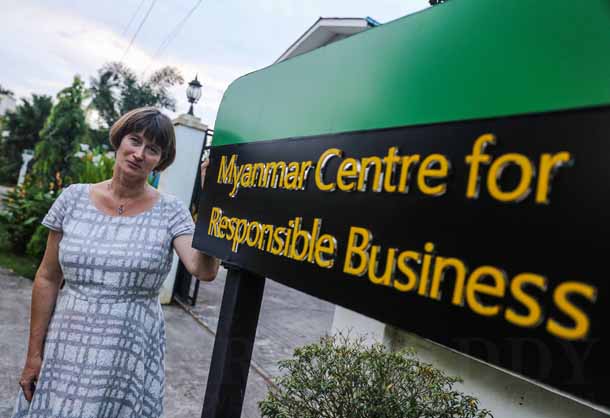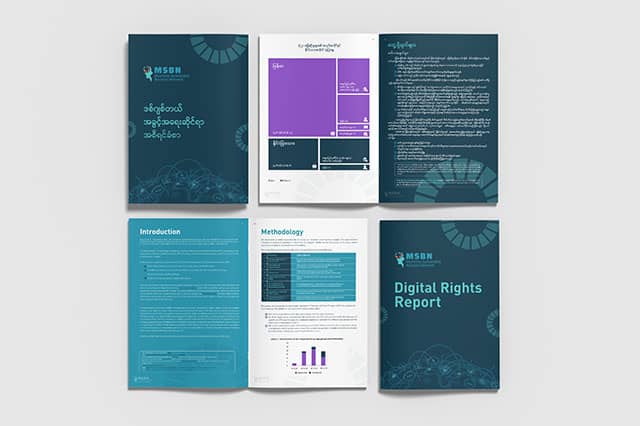Director Vicky Bowman gives an interview to Irrawaddy magazine about the work of the Centre

Interest in Burma’s once moribund economy has never been more intense, with the country’s opening to the West and a lifting of economic sanctions beckoning business scouts far and wide. And while that means jobs and development, it also brings concerns in a nation with a long history of human rights abuses and an uncertain legal landscape.
Investments around the country have led to ongoing conflicts that have pitted local communities against companies, environmentalists against the government, and in one high-profile clash, police officers against monks.
That’s where the Myanmar Centre for Responsible Business hopes it can help, offering itself as a resource to foreign and local executives, government officials and civil society.
Its director, Vicky Bowman, served the better part of a decade among the British diplomatic corps to Burma, including more than three years as ambassador. She most recently worked as the global practice leader for external affairs at mining giant Rio Tinto, where she oversaw initiatives on transparency, human rights and community engagement. Bowman, a fluent Burmese speaker, sat down with The Irrawaddy to discuss the center’s plans, the challenges to doing business in Burma, and the importance of companies engaging with local communities.
Question: Who does your centre serve?
Answer: The center sees its primary stakeholders as being Myanmar [Burma] businesses, both large and small, and then secondarily, international businesses of all nationalities. What we’re trying to do with the first set of stakeholders is help them understand what international standards and expectations of them are, so that they can be effective partners and effective suppliers to global supply chains. So it may be standards around transparency, it may be anticorruption, it may be standards around workers’ rights.
For international businesses we are here as a resource to help them understand what the specific social risks, human rights risks, of investing here are, and how they can work with local organizations so they have a better understanding of what they should do in the country to be responsible.
And then the third set of stakeholders is Myanmar civil society, both its organized groups but also the communities who are affected by business investment. For them, it’s around helping those groups to understand what expectations they should have in terms of behavior, both from Myanmar businesses and international businesses, and how to hold them to account on that.
The final stakeholder is government, because obviously without government as a regulator you will not get effective, responsible business.
Q: One of your initiatives will be the publication of ‘sector-wide’ impact assessments. Can you tell me more about these?
A: Normally when you do an ESIA [Environmental/Social Impact Assessment], you do it on one project, you often do it for the company, and then the company keeps the findings confidential or shares them with government, and it’s very rare that the government publishes them. Whereas the intention here is to not look at a single project or a single company, but to look at the experiences of communities, employees and employers in a particular sector—for example, oil and gas. And from that draw some conclusions which are more generic around recommendations on how to reduce negative impacts and increase positive impacts on communities, employees and so on, so that companies will hopefully not repeat mistakes of the past.
Q: When do you hope to have the assessments completed?
A: Our aim is to have those two completed [oil and gas, and tourism] by March next year, and in particular what we’re seeking to do with the oil and gas one is to have it as a useful report in time for the announcement of the bids in the ongoing offshore and onshore round, because those companies are being told that they will have to fairly rapidly do ESIAs. We hope that by doing a sectoral impact assessment, it will make life easier for those companies because it gives them a starting point, they don’t have to reinvent the wheel.
Next year we’ll start on agriculture and ICT [Information and Communication Technologies].
Q: Is the government gaining a better understanding of what constitutes responsible business?
A: I think it is, but there is still a long way to go and part of it is the fact that what may be understood by the central government isn’t yet necessarily understood out in the regions or allowed for in the bureaucracy.
What we’re hearing is yes, we want to have responsible businesses. But what we’re also seeing, I think, off the back of Myitsone[a Chinese-backed megadam project now suspended] and Letpadaung [a Chinese-backed copper mine], is that those companies who were here previously understand that the situation is changing and they are starting to change their approaches. What is really important, and the message that we keep saying to all companies that we’re talking to, is direct contact between company and community, because that’s what you really need in order to establish trust. If you allow, as a company, your contact with the community only to be mediated via government, that’s where you start to get problems in any country, and certainly one where distrust of the government is still a major factor.
Q: Do you think Chinese companies, some of which have been targets of significant anger from local communities, will seek the counsel of your center?
A: We’ve already had some. The Chinese Embassy has arranged for us to meet with some of the major Chinese companies, so we’ve started a discussion with Wanbao Mining [which runs the Letpadaung mine] and heard the changes they’ve made to date.
Q: A Wanbao representative described the renegotiated contract as a model for other foreign companies investing in Burma. Do you agree with that?
A: I think what’s happening, and particularly the renegotiation, will certainly have an impact on future mining contracts. Things like the 2 percent net profit into a fund for communities will also potentially be taken by the government and put into future contracts. What I’d like to see here though is also contract transparency, in other words that this contract should be publicly available, and nowadays that’s becoming increasingly the norm.
Q: What do you see as the biggest challenges for local businesses as this economy opens up?
A: The need to shift away from the old practices of the past, where they kept four different books and didn’t pay taxes. I think that whole question of corporate transparency is a big challenge because I know a lot of companies that are coming in from outside are having real problems finding partners who they feel comfortable with. While I don’t think that international companies are necessarily going to hold it against companies for behaving in noncompliant ways in the past, they need to be confident that they’re going to be compliant in the future, because as an international company, you are responsible for the behavior of your business partners.
Q: Coca-Cola is perhaps the most high-profile case of a multinational partnering with a local firm. Have you talked to them about what that process has been like?
A: It’s quite clear that they’re being very active on the whole question of corruption. They’ve got the Coke Code of Conduct in Burmese, they’re developing things like cards for the drivers in the distribution network to handle the police when the police try to extract payoffs. So they’re trying to find practical ways to address corruption both at the low level and also being very cautious of the need to avoid it at the high level.
Q: Given the reforms of the last two years, and uncertainty about the durability of those changes, have you heard from businesses that they are waiting until after the 2015 elections to get involved here?
A: Some are saying that, some not. All of these questions need to be looked at also in the wider context of a business’s portfolio. Right now, with the economy in a bit of a downturn, with commodity prices down, companies are not looking to take on risky destinations. For the mining sector, had this been five or six years ago, I think you would already have more companies here. I think that’s one of the key issues; that people, when they’re looking at 2015, they’re not just looking at it in terms of what that will mean for changes to government. They’re hoping the market will become a more attractive destination, because right now it’s having problems competing with other countries in the region that have more established legal frameworks.
Q: The United States has human rights reporting requirements for companies investing here, which some companies have complained about for reasons of competitive disadvantage. Do you think requirements like that should be more widely adopted?
A: I think with all of those requirements, the competitive disadvantage question is more a matter of the bureaucratic cost. The act of being transparent about what you’re doing, who your partners are, is increasingly becoming one of competitive advantage. It’s getting that balance right, requiring companies to be transparent while not requiring them to report the little stuff that doesn’t matter.
The US reporting requirements have faced criticisms from an NGO coalition who are looking at this, that of the ones who have reported to date, there isn’t sufficient detail, and that’s a valid criticism and it’s a learning process, and we’re only at an early stage in terms of US companies here. The way that Coke reports—I think it is planning its first report by the end of the year—could be a benchmark for what good reporting looks like.
My parent organization, IHRB [Institute for Human Rights and Business], put in a submission suggesting the EU should introduce similar reporting requirements to encourage scrutiny, and potentially this is going to become part of the wider global push toward transparency by corporates. Although this is a test case, I don’t think it’s necessarily going to stop with Burma.
Q: How should companies handle this new culture of protest in Burma?
A: For a company, it comes back to having built that solid relationship with the community, because if you understand community dynamics, you know whether the voices that you’re hearing are of the community or are issue protestors who have come in from outside, and if the community has confidence in you then they are more likely to say to activists who they don’t see as pursuing their interest, ‘It’s fine, please go away.’
Again, it all comes back to getting that strong relationship with the communities—which takes time, and that is one of the key things to watch out for on Wanbao Letpadaung. You cannot solve community outrage in the space of a year or six months, it requires a lot of going and being shouted at for several years—and listening.
Q: What do you tell companies that are concerned about land tenure issues?
A: The advice we give to companies is that land and corruption are probably the two biggest challenges they’ll face here. In the end it’s for them to do their due diligence and to establish, to the extent they can, what the land ownership is, and also to pursue, if appropriate, appropriate compensation practices that will be effective and not lead to the protests that we’ve seen elsewhere.
Q: If you had to sum up a bit of advice for companies considering investing here, what would it be?
A: Do your due diligence and extend it beyond anti-bribery into looking at the range of social and human rights issues you’re going to encounter. The other thing I would say is work with others in the sector; see them not only as competitors but also as people with whom you can make common cause to address some of these issues.
 English
English မြန်မာ
မြန်မာ မြန်မာ (unicode)
မြန်မာ (unicode)










